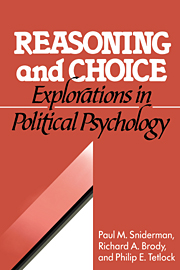Book contents
- Frontmatter
- Contents
- List of tables and figures
- Preface
- 1 Introduction: major themes
- 2 The role of heuristics in political reasoning: a theory sketch
- 3 Values under pressure: AIDS and civil liberties
- 4 The principle–policy puzzle: the paradox of American racial attitudes
- 5 Reasoning chains
- 6 The likability heuristic
- 7 Democratic values and mass publics
- 8 Ideological reasoning
- 9 Information and electoral choice
- 10 Stability and change in party identification: presidential to off-years
- 11 The American dilemma: the role of law as a persuasive symbol
- 12 Ideology and issue persuasibility: dynamics of racial policy attitudes
- 13 The new racism and the American ethos
- 14 Retrospect and prospect
- Notes
- Bibliography
- Subject index
- Author index
6 - The likability heuristic
Published online by Cambridge University Press: 05 May 2010
- Frontmatter
- Contents
- List of tables and figures
- Preface
- 1 Introduction: major themes
- 2 The role of heuristics in political reasoning: a theory sketch
- 3 Values under pressure: AIDS and civil liberties
- 4 The principle–policy puzzle: the paradox of American racial attitudes
- 5 Reasoning chains
- 6 The likability heuristic
- 7 Democratic values and mass publics
- 8 Ideological reasoning
- 9 Information and electoral choice
- 10 Stability and change in party identification: presidential to off-years
- 11 The American dilemma: the role of law as a persuasive symbol
- 12 Ideology and issue persuasibility: dynamics of racial policy attitudes
- 13 The new racism and the American ethos
- 14 Retrospect and prospect
- Notes
- Bibliography
- Subject index
- Author index
Summary
The heart of our research program centers on the notion of heuristics, and this chapter supplies the fullest specification we have managed of a judgmental shortcut – the likability heuristic.
So named to underline the role of likes and dislikes in impression formation, the likability heuristic has a property that deserves particular emphasis: Follow the rule of predicting what others believe by taking account of what you believe, weighted by your feelings toward them, and you will be right, by and large. In contrast, the customary account of how likes and dislikes shape impression formation provides an explanation of how people go wrong, particularly by exaggerating the similarity of others they like to themselves – the so-called false-consensus effect.
It remains for us an unexploited paradox that it can be easier, as a comparison of this chapter with Chapter 8 will suggest, to get a grip on people's political thinking by investigating what they think others think as against what they themselves think.
The study of public opinion consists, with few exceptions, of the study of the beliefs and preferences of individual citizens. This chapter explores a new subject: not what individuals themselves believe, but what they believe others believe. Two questions concern us. First, to what extent can citizens estimate accurately the position of politically strategic groups on major issues? Second, how can they figure out what such groups stand for, given how little they know about politics?
- Type
- Chapter
- Information
- Reasoning and ChoiceExplorations in Political Psychology, pp. 93 - 119Publisher: Cambridge University PressPrint publication year: 1991



